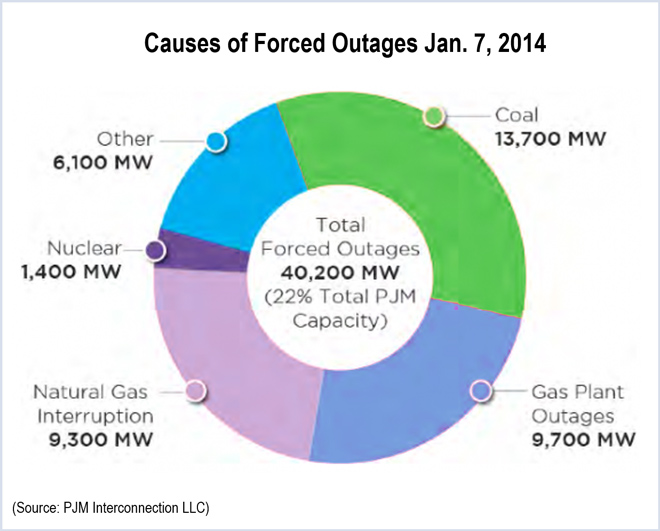ComEd Smart Grid Bill Becomes Law
Republican Gov. Bruce Rauner has approved a bill allowing Commonwealth Edison and Ameren Illinois to avoid legislative review of a sweeping grid modernization program until 2019 instead of 2017.
Critics, including the Citizens Utility Board, worry that the move will allow the utilities to increase electric rates without being held accountable enough for their performance.
The bill passed both houses last year with bipartisan support, and Senate President John Cullerton (D-Chicago) waited to send it to the governor’s office until outgoing Democratic Gov. Pat Quinn, historically a utility antagonist, left office.
More: Chicago Tribune
KANSAS
KCC Orders Reduction of Wastewater Injection
The Corporation Commission has ordered a reduction in the amount of drilling wastewater injected into deep disposal wells in light of a report linking the injections with earthquakes. The order relates to two counties bordering Oklahoma, which has experienced an increase in seismic activity apparently related to the disposal of wastewater produced from oil and gas wells.
“Because individual earthquakes cannot be linked to individual injection wells, this order reduces injection volumes in areas experiencing increased seismic activity,” the order states. “The commission finds increased seismic activity constitutes an immediate danger to the public health, safety and welfare. The commission finds damage may result if immediate action is not taken.”
The commission cited a study by the U.S. Geological Survey that showed an increase in the number of earthquakes corresponded with an increase in wastewater disposal. There were 30 earthquakes in Kansas between 1981 and 2000. In the first three months of this year, there have been 51 recorded earthquakes.
More: EcoWatch
MARYLAND
Wind Project Dies in Face of Air Station Concerns

State lawmakers pushed through a 15-month moratorium on the $200 million development, which then-Gov. Martin O’Malley vetoed. U.S. Sen. Barbara A. Mikulski pushed through a measure halting the project amid concerns that the turbine towers would interfere with the air station’s radar system. More legislation blocking wind development across the Chesapeake Bay on the Eastern Shore is brewing, with opposition growing against a planned 130-MW wind project near Kennedyville in Kent County. In view of the opposition, Adam Cohen, vice president of Pioneer Green Energy, decided to surrender. “We are truly saddened we cannot bring new investment, jobs and tax base” to Somerset County, he wrote to county officials.
More: The Baltimore Sun
MINNESOTA
Minnesota Power, State Reach Agreement on SO2 Releases

Minnesota Power has struggled to bring the plant into compliance and announced the closing of one of the three boilers this year. It also installed emissions-control technology, but it has not performed as expected. In addition to retiring one unit, the company will also pay a $1.4 million fine and spend $4.2 million on community projects. It will also need to submit a plan to the Public Utilities Commission that will outline what steps are being taken to reduce emissions further.
More: Midwest Energy News
MISSOURI
Supreme Court Rules Empire Must Offer Solar Rebates to All

The case came to the state’s high court as a result of developments dating back to 2007, when the state’s Renewable Energy Standard was passed. That standard called for utilities to get 15% of their energy from renewable sources by 2021 and to offer rebates to customers who wanted to install solar panels. But in 2008, lawmakers passed H.B. 1181, which exempted Empire from solar requirements. Renewable proponents challenged the law in court.
More: The Joplin Globe
NEW JERSEY
BPU Considering Request by New Jersey Natural Gas for Pipeline

Already the plan is attracting opponents, who have previously organized against another project the company is involved with, the PennEast project. That proposed pipeline, which would run 110 miles from eastern Pennsylvania to Mercer County, has been the focal point of major opposition from community and environmental groups in both states. Some environmentalists note that the Southern Reliability Link is routed to go through federally protected pinelands. The first public hearings on the project have not yet been scheduled by the BPU.
More: NJ.com
NORTH CAROLINA
Bill Would Allow Third-Party Leasing for Solar Installations
A Republican-backed bill would allow independent third-party energy companies to sell directly to homes and businesses. While the bill will likely attract opposition from utilities, the legislation would benefit solar developers. Major corporations are being enlisted to support the bill, which would allow independent companies to lease solar installations to home and business owners, and then sell the power produced directly to the owners, cutting out the utilities entirely. Wal-Mart, Target and Lowe’s have contacted House Speaker Tim Moore to support the bill, called the Energy Freedom Act.
“I’m coming at this from a Republican viewpoint,” said bill sponsor Rep. John Szoka of Fayetteville. “I believe in free markets and I believe in property rights. This allows property owners to use their property as they see fit.”
The state is already the nation’s fourth largest solar producer.
More: The News & Observer
NORTH DAKOTA
State to Study Effects of Clean Power Plan
While the U.S. Environmental Protection Agency has released studies showing the probable impact of the rules of the Clean Power Plan on the nation, none of those studies get down to the state and local level. North Dakota hopes to change that by ordering a study that will examine the expected effects of the Clean Power Plan on natural gas prices, electricity rates and renewable energy production in the state. Gov. Jack Dalrymple signed a bill authorizing a study of the rules, which are expected to take effect this summer. Jason Bohrer, president of the Lignite Energy Council, said the study will look at the financial implications of the federal rules.
More: The Bismarck Tribune
OHIO
PUCO Denies Duke’s Guarantee Return Scheme
The Public Utilities Commission turned down Duke Energy’s request that it receive a ratepayer-guaranteed return for its share in two older coal-fired generation plants, rejecting the company’s argument that the arrangement would have provided long-term price stability for customers. PUCO in February denied a similar request by American Electric Power.
FirstEnergy has a similar request pending before the commission, and AEP has a request concerning other plants it says are at risk of closing if they are not guaranteed prices. The most recent decision involved the coal-fired plants owned by the Ohio Valley Electric Corp. OVEC’s shares are owned by Duke, AEP and FirstEnergy, among other companies. If PUCO had approved Duke’s request, its Ohio utilities would have purchased power from the plants at a long-term contract and then passed that price on to customers. Opponents have called the arrangements bailouts for the generating companies.
More: Midwest Energy News
Gov. Kasich Names Porter as Chairman of PUCO

Andre Porter, a 35-year-old Republican and former member of the Public Utilities Commission who stepped down from the state Department of Commerce to rejoin it, was named PUCO chairman by Gov. John Kasich. Porter’s five-year term begins this week. He replaces Tom Johnson, who announced his resignation as chairman earlier this month. Johnson will fill out his term as one of the five members of the commission. Porter was widely seen to be Kasich’s choice when Johnson resigned.
More: The Columbus Dispatch
OKLAHOMA
AG Urges OCC to Drop Mustang Replacement from OG&E’s Plan
The state Attorney General’s office said Oklahoma Gas and Electric has not provided enough information about its planned replacement of the aging Mustang power plant to justify its request for $344 million in replacement costs. An assistant attorney general requested that the Corporation Commission drop the Mustang replacement request from the company’s $1 billion rate case. The company, however, disagrees. “There is a huge record in this case, and much of it is related to Mustang,” said Bill Bullard, an attorney for OG&E. If all of OG&E’s rate case is approved, it would increase the average residential customer’s bill by about 15%. The plan would replace the aging units with seven 40-MW combustion turbines.
More: The Oklahoman
PENNSYLVANIA
PECO, PPL Ask PUC Approval to Boost Fixed Customer Charges
PECO and PPL Electric have filed requests with the Public Utility Commission that include substantial increases in the basic monthly customer charges. PECO asked to increase its monthly customer charge 68%, from $7.13/month to $12. PPL wants to increase its monthly rate from $14.13/month to $20, a 42% increase. The charges remain the same no matter how much electricity the customer uses. Both companies say they want to raise the charges to fund maintenance and upgrade costs for their electric distribution systems. In PECO’s case, the new charges would result in $84.5 million in revenue, almost half of the $190 million of its overall rate hike request.
Consumer advocates are crying foul, though. “It’s poor public policy,” said Bill Malcolm, a senior legislative representative for AARP. “Raising the fixed monthly charge lowers the variable per-kilowatt charge, which creates a disincentive for conservation and energy efficiency and gives consumers less control of their bill.” Others say the fixed rates strip away any incentive to reduce power usage. “It gives consumers less control of their bill because more of their bill is fixed and not based upon their usage,” acting Consumer Advocate Tanya McCloskey said.
More: The Philadelphia Inquirer, CBSPhilly
Some Electricity Users to See Rate Hikes
Customers of Pennsylvania Electric and Pennsylvania Power will pay more for electricity beginning next month — about 13% more for Penelec customers and 7% for Penn Power customers.
The increases are part of rate settlements approved last week by the Public Utility Commission for FirstEnergy’s four state subsidiaries: Penelec, Penn Power, West Penn Power and Met-Ed.
The rate hikes are lower than what FirstEnergy originally requested last August. The increases in the base distribution rates are effective May 19 and are the first for each of the four subsidiaries in at least 20 years, according to the PUC.
More: The Meadville Tribune
VIRGINIA
Duke Agrees to $2.5M Settlement over Dan River Ash Spill
Duke Energy has agreed to a $2.5 million settlement with state environmental officials to offset damage caused when 39,000 tons of toxic coal ash from a retired power plant spilled into the Dan River. The company has reached a $102 million settlement with federal authorities and was fined $25 million by North Carolina in connection with the spill, which fouled 70 miles of the Dan River. The Department of Environmental Quality said $2.25 million will fund environmental projects in communities affected by the spill, and the remaining $250,000 will be retained for a DEQ environmental emergency fund. Danville, perhaps the hardest hit of the communities, is still negotiating with Duke over the spill.
More: The New York Times; Department of Environmental Quality
WISCONSIN
Workers Banned from Using ‘Climate Change’

The three-member Board of Commissioners of Public Lands has enacted a state ban on its employees using the term “climate change.” The reasoning, according to State Treasurer and Republican Matt Adamczyk: Climate change is “not part of our sole mission, which is to make money for our beneficiaries. That’s what I want our employees working on. That’s it. Managing our trust funds.”
The term “climate change” must not enter into that specific conversation, Adamczyk and Attorney General Brad Schimel, the other Republican sitting on the board.
“Having been on this board for close to 30 years, I’ve never seen such nonsense,” said the third member, Democrat and Wisconsin Secretary of State Doug La Follette, who voted against the measure. “We’ve reached the point now where we’re going to try to gag employees from talking about issues. In this case, climate change. That’s as bad as the governor of Florida recently telling his staff that they could not use the words ‘climate change.’”
More: Bloomberg Business News
Compiled by Ted Caddell










